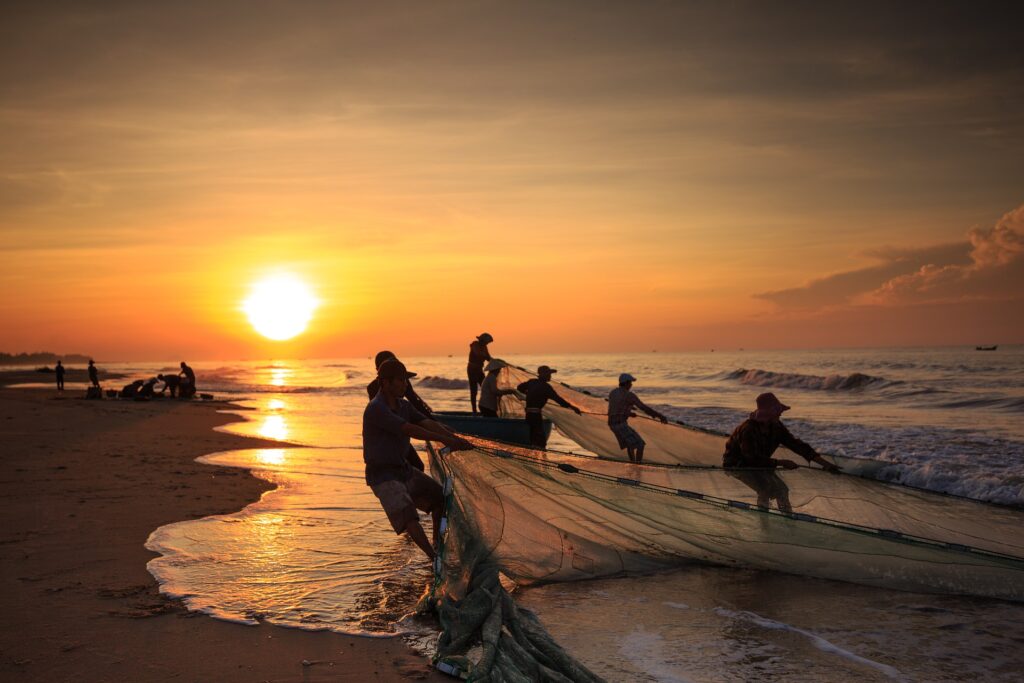Pathway Description
Ocean governance and human rights are closely linked, as the ocean is a crucial resource for many communities around the world, particularly those in developing countries, and their livelihoods, food security, health, and cultural traditions are tied to the ocean’s health and productivity. Ensuring sustainable and equitable management of the ocean’s resources is therefore critical to protecting the human rights of these communities. In many respects, ocean’s healthy is also linked to everyone’s human rights to health and a healthy environment, due to the ocean’s contributions to the global water cycle, climate regulation and global food security.
Fisheries and aquaculture are two sectors that are closely tied to human rights, as they provide food and income for millions of people. Sustainable management of these sectors is critical to ensuring that people have access to sufficient and nutritious food, which is recognized as a basic human right. Effective fisheries management can also help to protect the rights of small-scale fishers, who are often among the most marginalized and vulnerable members of coastal communities.
Ocean plastics are also an important issue related to human rights, as plastic pollution can have serious impacts on the health and well-being of people, particularly those living in coastal communities. Plastics can contaminate seafood and other food sources, leading to health problems, and can also harm marine life, which can impact the livelihoods of those who rely on the ocean for their income.
Finally, ocean defenders, or those who work to protect the ocean and its resources, can have their human rights violated, as they often face threats and violence in their efforts to protect the ocean. Increasingly, ocean defenders are being recognized as environmental human rights defenders, as their work contributes to protect the ocean to the benefit of everyone’s human rights and future generations.
Overall, effective ocean governance is critical to protecting the human rights of people who rely on the ocean, and addressing issues such as fisheries management, plastic pollution, and the safety of ocean defenders are important steps towards achieving this goal.
What you’ll learn
- Why a healthy ocean is important for human rights
- Why equity and human rights considerations are essential to transformative change of ocean governance
- How fisheries, aquaculture and human rights are connected
- How ocean plastics have an impact on human rights
- Why ocean defenders should be protected as environmental human rights’ defenders
Time Required for the completion of the full pathway – 1 hour and 30 minutes
NOTE that you need not complete the entire learning pathway in one lesson.
Learning Outcomes
NOTE It is up to the learner to measure their progress against the learning outcomes indicated below. There will be no facilitated assessments of the same.
By the end of this course you should be able to:
- Describe human rights and why they matter to ocean governance
- Understand why fisheries and aquaculture are important to human rights
- Know the link between ocean plastics and human rights
- Understand what human rights’ protection should be afforded to ocean defenders
Pathway Content
Module 1 INTRODUCTION - WHAT IS INTERNATIONAL HUMAN RIGHTS LAW AND WHY IT MATTERS?
This module explains the important concept of human rights, what it entails, the range of internationally accepted rights and the foundation of human rights law. You will discover why human rights discourse is crucial to ocean governance and management
Module 2 FISHERIES, AQUACULTURE AND HUMAN RIGHTS
The link between fisheries, aquaculture, and human rights is essential as both industries significantly impact the livelihoods, food security, and economic development of coastal communities worldwide. Access to fishery resources is also critical for the realization of everyone's human rights to food, and fishery workers' rights must be protected to prevent exploitation and forced labor. Aquaculture can contribute to food security and poverty reduction, but it must be developed sustainably and with respect for the rights of local communities and workers. Additionally, fisheries and aquaculture policies must consider the rights of indigenous peoples, small-scale fishers, and women, who are often marginalized in these industries.
Module 3 HUMAN RIGHTS AND OCEAN PLASTICS
Ocean plastics have serious implications for human rights, particularly for communities who rely on the ocean for their livelihoods and food security. Plastic pollution can harm marine life, impacting fisheries and aquaculture, and ultimately affecting human nutrition and health. In addition, the cleanup of plastic waste can have significant economic and social costs, with disadvantaged communities often bearing the brunt of these impacts. Addressing the problem of ocean plastics requires action to reduce plastic use, improve waste management, and promote a circular economy. These actions must also take into account the rights of affected communities and ensure their full participation in decision-making processes.
Module 4 OCEAN DEFENDERS
Ocean defenders play a crucial role in protecting the marine environment and safeguarding human rights. By advocating for stronger ocean policies, identifying destructive or inequitable ocean uses, and promoting sustainable practices, ocean defenders can help ensure that the ocean and the communities that depend on them are protected. The protection of ocean defenders as environmental human rights defenders is essential to ensure the enjoyment of human rights by all, including future generations.
Module 5 Quiz
Test your knowledge of human rights and the ocean.
Start Learning Pathway